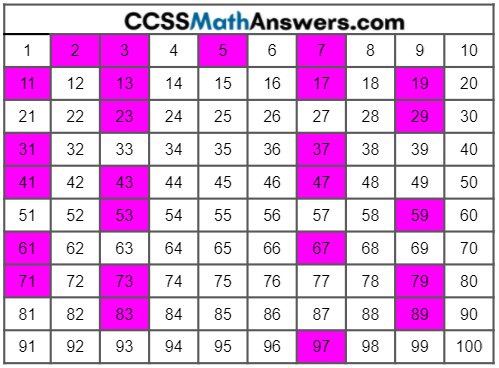

Notice that between 1 and 100 there are 25 prime numbers. It’s a process called the Sieve of Eratosthenes. The Greek mathematician Eratosthenes (3rd-century B.C) designed a quick way to find all the prime numbers up to any given number. You don’t have to memorize them but it would be best if you remember the smaller numbers, such as 2, 3, 5, 7, 11, 13. This is our list of prime numbers from 1 to 100. All of these numbers had already been crossed out so we have finished crossing out all of the composite numbers on our table. The next prime number is 11, so we cross out all of the multiples of 11 which are 22, 33, 44, 55, 66, 77, 88, and 99. Then we have the prime number 7 and we cross out all of the multiples of 7. The next prime number is 3, so we can cross out all the multiples of 3 since they will be composite numbers.Īfter 3, is the next prime number 5, so we cross out all of the multiples of 5. We cross out all of the multiples of 2 on the table. 2 is a prime number but all of the multiples of 2 will be composite numbers since they will be divisible by 2.

We are going to create a table with all of the prime numbers that exist up to 100. So, if you divide the number by anything other than one or itself, you will get a remainder that is not zero. 3 times 17 is 51.Prime numbers are the numbers that are only divisible by themselves and 1, in other words, if we try to divide them by another number, the result is not a whole number. The answer- it is not prime, because it is alsoĭivisible by 3 and 17. Other than 1 or 51 that is divisible into 51. Video here and try to figure out for yourself What about 51? Is 51 prime? And if you're What about 17? 1 and 17 willĭefinitely go into 17. And 16, you could have 2 timesĨ, you could have 4 times 4. So if you can find anythingĮlse that goes into this, then you know you're not prime. So clearly, any number isĭivisible by 1 and itself. Let's think about some larger numbers, and think about whether 7, you can't breakħ is equal to 1 times 7, and in that case, you really And notice we can break it downĪs a product of prime numbers. Numbers, it's not theory, we know you can't But it's the same ideaīehind prime numbers. You do, you might create a nuclear explosion. They first- they thought it was kind of the Them down anymore they're almost like theĪtoms- if you think about what an atom is, or Special case of 1, prime numbers are kind of theseīuilding blocks of numbers. Of them, if you're only divisible by yourself and Irrational numbers and decimals and all the rest, just regularĬounting positive numbers. Not including negative numbers, not including fractions and That you learned when you were two years old, not including 0, Numbers- numbers like 1, 2, 3, 4, 5, the numbers So it has four naturalĮxactly two numbers that it is divisible by. Try a really hard one that tends to trip people up. So once again, it's divisibleīy exactly two natural numbers- 1 and 5. But it is exactlyĭivisible by 5, obviously. You could divide them into it,īut you would get a remainder. So it does not meet ourĬonstraints for being prime. Well, 4 is definitelyĭivisible by 1 and 4.

It's not divisible by 2, soģ is also a prime number. And it's really not divisibleīy anything in between. Well, 3 is definitelyĭivisible by 1 and 3. And 2 is interestingĪny other even number is also going to beĭivisible by 2, above and beyond 1 and itself. That color for the- I'll just circle them. It in a different color, since I already used Two natural numbers- itself, that's 2 right there, and 1. So 2 is divisible byġ and by 2 and not by any other natural numbers. So 1, although it might beĪ little counter intuitive is not prime.

Of our definition- it needs to be divisible byĮxactly two natural numbers. So you might say, look,ġ is divisible by 1 and it is divisible by itself. And if this doesn'tĮxamples here, and let's figure out if some Want to say exactly two other natural numbers,īecause one of the numbers is itself. One of those numbers is itself,Īnd the other one is one. It is a natural number divisibleīy exactly two numbers, or two other natural numbers. It is a natural number- and a natural number, onceĪgain, just as an example, these are like the numbers 1, 2,ģ, so essentially the counting numbers startingĪt 1, or you could say the positive integers. What encryption means, you don't have to worryĪbout it right now. That your computer uses right now could beīased on prime numbers. Your mathematical careers, you'll see that there's actuallyįairly sophisticated concepts that can be built on top of


 0 kommentar(er)
0 kommentar(er)
